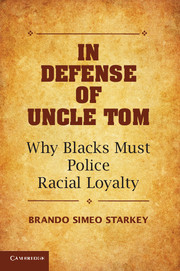Book contents
- Frontmatter
- Dedication
- Contents
- Acknowledgments
- Introduction
- 1 Solidarity, Social Norms, and Uncle Tom
- 2 Uncle Tom: 1865–1959
- 3 The Unwitting Pioneers
- 4 Uncle Tom: 1960–1975
- 5 No Man Was Safe
- 6 Uncle Tom Today: 1976–Present
- 7 So What About Clarence?
- 8 The Curious Case of Uncle Tom
- 9 What Now, Uncle Tom?
- Final Address
- Index
- References
4 - Uncle Tom: 1960–1975
Published online by Cambridge University Press: 05 May 2015
- Frontmatter
- Dedication
- Contents
- Acknowledgments
- Introduction
- 1 Solidarity, Social Norms, and Uncle Tom
- 2 Uncle Tom: 1865–1959
- 3 The Unwitting Pioneers
- 4 Uncle Tom: 1960–1975
- 5 No Man Was Safe
- 6 Uncle Tom Today: 1976–Present
- 7 So What About Clarence?
- 8 The Curious Case of Uncle Tom
- 9 What Now, Uncle Tom?
- Final Address
- Index
- References
Summary
Uncle Tom Versus the Integrationists
With segregation’s grip loosening, some black integrationists during the early 1960s unclenched their fists and began flirting with the idea that Uncle Toms no longer needed to be fought. Uncle Toms, once threatening civil war, were suddenly no longer an intra-racial foe, it seemed. Indeed, less than a decade after Brown, black integrationists – the folk who previously bemoaned the presence of Uncle Toms – began to publically muse that their adversaries were no longer present to hinder their good work.
In this vein, Dr. Robert C. Weaver, chairman of the NAACP’s board of directors, proclaimed in 1960 that Southern sit-in efforts indicated that “‘Uncle Tom’ is being destroyed as the stereotype of the American Negro.” And after the 1960 Civil Rights Bill’s passage, Weaver claimed that the NAACP was “softening up Uncle Tom for the knock-out blow.” Leslie W. Dunbar, head of a Southern civil rights organization, insisted that “Jim Crow cannot live without Uncle Tom, and Uncle Tom is dying fast.” Dr. C. Eric Lincoln, a professor and expert on the black church, also asserted that Uncle Tom was practically dead. “The image of Uncle Tom, the Negro who passes out the white man’s favors and helps keep his people down, is an image that is gone now,” declared the academic. “Uncle Tom,” Lincoln further pronounced, “is [no] longer an effective agent of class control, nor can he any longer deliver even the fractional benefits which made him a power in the Negro community.”
- Type
- Chapter
- Information
- In Defense of Uncle TomWhy Blacks Must Police Racial Loyalty, pp. 158 - 193Publisher: Cambridge University PressPrint publication year: 2015



